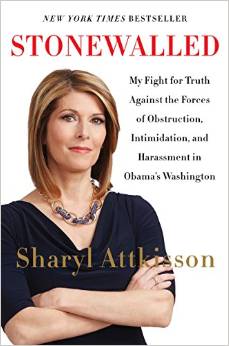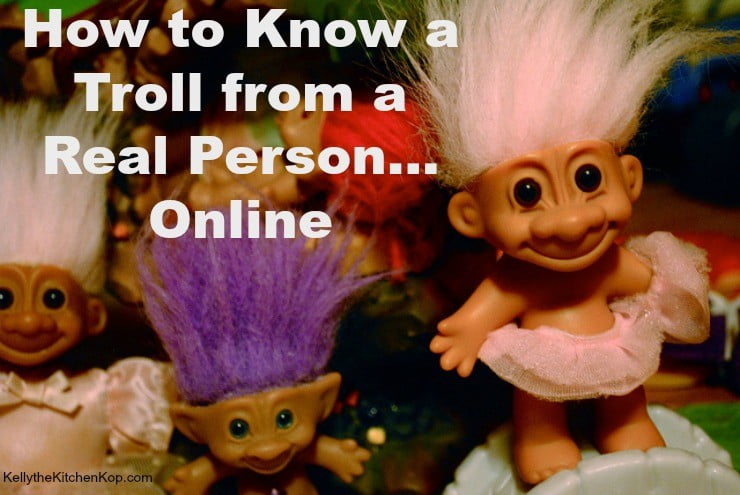by Joanie Blaxter, founder of Follow Your Gut
How to Recognize a Troll Online
A few weeks ago Kelly published an article I wrote that grew out of observing a friend of mine struggle to stop drinking diet soda called, Hope for Your Diet Soda Addiction: How to Detox from Aspartame. About a week after publication, a comment appeared at the bottom, very different in tone and wording than most of Kelly's down home, thoughtful, real people replies to what she publishes. (Notice Kelly edited the comment to give him a new name.)
The commenter, who gave no photo, no name and no email address simply said, “Most important line in this whole blog that is loaded with affiliate links is ‘neither Joanie nor I are health professionals.'”
I WAS THRILLED!!!!
Why? That anonymous comment meant that, as a published writer, I had just graduated! From what, you ask? From writer to “influencer!”
You see, my first thought was that the sentence was posted by a paid corporate media specialist. You know, a “troll.” An “astroturfer.” Not a real person. Someone who's paid to represent special interests, not those of the public. In this case, I was sure it most likely came from someone representing the diet soda industry.
Whhhhhoooooo hooooooooo! It feels good to be effective enough to be noticed!
What is a “troll” or “astroturfer?”
Astroturf” is the effort on the part of special interests, whether corporate or political, to surreptitiously sway public opinion and make it appear as though it's a grassroots effort for or against a particular agenda, when in reality such a groundswell of public opinion might not exist…
Hallmark signs of astroturfing include using key language—words such as crank, crack, nutty, pseudo, conspiracy, and other language that's effective with the public to try to make you dismiss an argument they don't like. Another hallmark of an Astroturf campaign is attacking those who are questioning authority…
(source: Seasoned Investigative Journalist Exposes Inside Strategies to Censor News)
 Sharyl Attkisson, a five-time Emmy Award winning investigative journalist and author of the book, Stonewalled: My Fight for Truth Against the Forces of Obstruction, Intimidation, and Harassment in Obama's Washington, clarifies what paid trolls do:
Sharyl Attkisson, a five-time Emmy Award winning investigative journalist and author of the book, Stonewalled: My Fight for Truth Against the Forces of Obstruction, Intimidation, and Harassment in Obama's Washington, clarifies what paid trolls do:
They turn to things like social media – Facebook and Twitter – using pseudonyms and multiple accounts to spread things around. They use their partners who blog for them, write things, and pick up on one another's work until sometimes it's been picked up in the mainstream media as if it's a fact.
It's all intended to make you feel as though if you hold a certain opinion that they don't want you to have, you're the outlier. Everybody else agrees with ‘X' except you, and that may not be the truth. This is a huge business… There are actually PR firms that specialize in these sorts of tactics. (my emphasis)
(source: Seasoned Investigative Journalist Exposes Inside Strategies to Censor News)
Whoa! “They use their partners…” In other words, these paid Public Relations internet trolls know each and work together in a co-ordinated way to dupe the public.
And what are they working together to make us believe?
Whatever their client pays them to make us believe.
In the large firms that tend to represent corporate, political, or celebrity interests, there are entire divisions of hundreds of interns dedicated to… leaving comments on blogs and news sites to harassing users on Twitter, from leaving a string of hostile anonymous asks on Tumblr blogs to charging headlong into Facebook discussions.
Hundreds. In each PR firm.
(source: Vaccines, PR and the News Cycle)
How did I come to the conclusion that the comment on my article came from a PR employee paid to discredit my article because of the content?
Once you know what to look for, it's not that hard to recognize which responses are likely astroturf…
…as opposed to legitimate questions or concerns from real people who genuinely want to understand an issue.
First of all, it's critically important to understand that Public Relations firms will say virtually anything to impact public opinion in their clients' interests. And who are their clients? For the most part, monied corporations protecting their bottom line, not people like you and me.
The second thing to realize is how employees of Public Relations firms are EVERYWHERE online; cruising facebook, twitter, and blog postings. I mean, this is what they are paid to do, all day, every day, 8 hours a day, 5 days a week: surf around, leaving targeted, nasty, disruptive statements.
Health activists who challenge corporate interests receive a high percentage of this kind of online attention.
The more time we, just plain ordinary folk, spend online, the more important it becomes to be an educated, discriminating consumer of information.
How can I tell if a commenter is a real person?
In addition to what Dr. Mercola describes above as the typical language used by professional trolls, keep in mind that trolls are paid to distract readers from the actual message of a posting. Look for that tactic when reading online comments.
Here are other questions to ask yourself every time you see a online comment in response to an article:
- Is the comment anonymous? Is there a picture, name or email address attached? If not, it's likely to be a paid “troll” who just stopped by briefly to sow doubt and move on.
- Does the commenter use inflammatory language that seems dropped in out of nowhere without any real application to the actual content of the article? Does it add to the dialog? Or derail it?
- Does the commenter complain about affiliate links? Paid social media astroturfers love to distract readers from hard-hitting information by drawing attention to the presence of affiliate links… as though it's a crime that bloggers need to make a living.
- Is the tone bullying and discourages a real dialogue?
Bingo on all four counts above for that response to my aspartame article! And all done in one single sentence to boot! Wow, just goes to show how much practice these paid social media astroturfers get day in and day out doing the same thing over and over. Brilliant!
This is why the owners of blogs, twitter, facebook accounts, etc. reserve the right to block and/or alter comments. Many comments are wildly off topic and designed to simply disrupt legitimate dialog about the subject matter.
What do you think? As a reader seeking information, what do you want to be able to both read and say? Where should bloggers draw the line in terms of the kinds of comments people can leave on their sites?
Please share your thoughts below and if you could share this post on social media, it helps a lot!
More Information
- Can We Really Trust Google??
- The Agency: Coordinated astroturf designed to create political instability
- Internet Trolls as Narcissists, Psychopaths and Sadists: Trolls as mentally unbalanced people
- Top 12 Signs You're Dealing with Trolls
- How to Identify and Defeat an Internet Troll
- From Kelly: Here's a post Kristen did on the topic a while back, Vaccines, PR, and the News Cycle
- TEDx Talk: Sharyl Atkinson on Astroturf and Manipulation of Media Messages:
 This was a guest post by my sweet friend, Joanie Blaxter, who is now a regular writer around here!
This was a guest post by my sweet friend, Joanie Blaxter, who is now a regular writer around here!
Joanie has been the Ventura County, California chapter leader of the Weston A. Price Foundation since 2010, and you can contact Joanie here for health consultations. Also, find all her past posts here.
Disclaimer: neither Joanie nor I are health professionals! Use what you read here as part of your own research and then consult with a natural-minded doctor or health professional you trust to find what is best and right for YOU. Read my entire disclaimer here, and also note that there may be affiliate links in this post.


 This was a guest post by my sweet friend, Joanie Blaxter, who is now a regular writer around here!
This was a guest post by my sweet friend, Joanie Blaxter, who is now a regular writer around here! 
Allison Campbell says
Hey Kelly, have you considered that maybe the war against sugar in health-conscious communities is also bad too? And that polyunsaturated fats (including fish oil) could be bad as well, as a primary cause of inflammation? I have been reading some of the work by the nutrition researcher Ray Peat, and he overlaps in his beliefs with the WAPF in that he says saturated fats are not bad, and that we should be consuming the whole animal, not just muscle meats (so drink your broth!). But he differs in things like what I mentioned above with sugar and PUFAs. I like WAPF but I don’t think all of it is right.
Kelly the Kitchen Kop says
I don’t completely avoid sugar myself, but make sure my sources are non-GMO and unrefined. Too much of any polyunsaturated fatty acids in relation to the amount of monounsaturated and saturated fats in our diet can be a problem. Both omega 6 and omega 3 fatty acids are polyunsaturated and we need a healthy balance of those too. I’d have to look into Ray Peat’s work a little more before having an opinion on it. Personally, I have a somewhat laid back approach to diet. We don’t avoid grains, gluten, or sugar, for example, but really mostly aim for real food from good sources.
Allison Campbell says
Your way definitely seems like the commonsense approach to nutrition. I think that whatever the tried and true traditional way of eating according to a person’s heritage is one of the best ways.
KindFoodFarm says
This is such an important issue. Thanks for bringing this up, Joanie and Kelly! I enjoyed Sheryl’s TEDx talk and plan to look into her book. I regret that she (or possibly her editor) chose to smear President Obama in the title of her book, as though this situation has anything to do with him: “Stonewalled: My Fight for Truth Against the Forces of Obstruction, Intimidation, and Harassment in Obama’s Washington.” Shady PR tactics have been around much longer than the Obama presidency and there is no reason to believe this is something he supports, so I find the title unfortunate. I’ll look further into the book, though, and hope that was just a mistake. (In reality, reporters and writers seldom have control over the headlines of their articles or titles of their books; that’s an editor’s job, and the publisher tends to win in a disagreement.)
Jill-David Boman says
Interesting timing! I believe I’m dealing with a troll now in the comments on this article. He fits the bill: commenting under a pseudonym, insulting me and misrepresenting what I’d shared, trying to shut down discussion…Maybe I should be flattered? https://www.washingtonpost.com/news/to-your-health/wp/2016/10/27/she-didnt-think-a-flu-shot-was-necessary-until-her-daughter-died/#comments

Kelly the Kitchen Kop says
Jill-David Boman good job for jumping in over there & commenting!!!!
Jill-David Boman says
Kelly the Kitchen Kop Thanks! It’s so hard to keep my mouth shut when I see the sheep racing towards the edge of the cliff!
Flo LaDuke Richards says
Remember those weird little toys fom the late 60’s/early 70’s? I never had any but thought they were so odd!
Kelly the Kitchen Kop says
Flo LaDuke Richards my siblings had them & I thought they were weird too!!
Flo LaDuke Richards says
I meant to come back and comment on the current trolls after reading the article but forgot to. It’s amazing what some people see as the purpose for their lives. :-/
Denise says
Thank you, Joanie! It is not difficult to “stick to your guns” when you know you are speaking the truth! It is just awful that we have to deal with trolls and astro-turfers at all.
Now that the “word is getting out” about them, people will be able to become more aware and stop them in their tracks or block them which is what I did in my situation.
Articles like yours and the ones you reference are really helpful as well as the TEDx Talk with Ms. Akinson.
Thank you, Denise
Denise says
I, too, had an email dialogue recently with someone I suspect was a troll who was promoting the “safety” of GMOs. She tried to label me, shame me and bully me; very old PR tricks that don’t work very well anymore with people who are confident and speak the truth and don’t have to rely on “spin.”
As a University of Arizona Master Gardener since 2004 and educator as well as a food historian, I am VERY confident about what I teach and the “truthful” websites I refer others to read such as Dr. Mercola’s, http://www.mercola.com. I know right away that when someone is demeaning and has to resort to childish tactics like name calling, etc., they ARE a troll!
Thank you, Denise
Joanie Blaxter says
I’m glad you stuck to your guns, Denise!
Lori Alexander says
I have had a lot of trolls commenting on my blog. When I first began blogging, it greatly disturbed me. Then I decided that I was the one who wanted to plant the seeds on my blog and didn’t want it to become a place of arguing and disagreement since it was my blog and I decided to keep the posts and comments on track with what I was teaching. Now, I moderate all comments and I only allow those who are encouraging or have legitimate questions; none that are demeaning or mean-spirited.
lorimathesonsmith says
I think if the blogger (in this case, Kelly) notices that someone fits the troll persona (even if just 75%) then call them out as a troll and then block them. Not because they do not have an opinion, but because they have a PAID opinion and are only there to cause problems.
It’s funny, because I almost commented in this person and decided they were not worth my time! Whenever someone says that one is not a ‘professional’, “expert”, or “doctor” you know that it is someone who is either trolling or who is too ignorant to do their own research.
I’m glad you outed this person and showed all the tell-tale signs as I had not given trolls much thought.
Joanie Blaxter says
Thank you, Lorima! That is exactly why I wrote this article. We all need to think more deeply about WHY someone may be leaving a shocking or disruptive comment, rather than simply feeling disturbed. Disturbance and doubt is exactly what they want your last impression to be! That way you don’t remember or think about the message of the article.
Joanie Blaxter says
Great to hear, Lori! While I don’t do any moderating of comments since Kelly, as the blog owner, does that, I will say I agree with you. I’m all for respectful questioning. Demeaning… not so much!
Lillian Hughes says
Wonder if any “trolls” will respond to this….